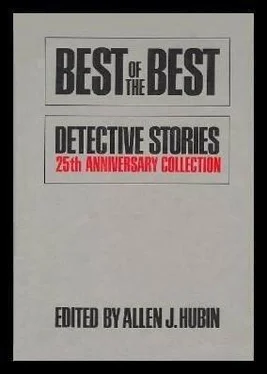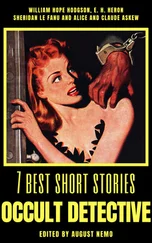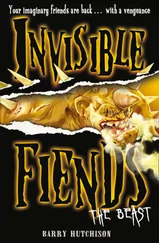Stephen Barr - Best of the best detective stories - 25th anniversary collection
Здесь есть возможность читать онлайн «Stephen Barr - Best of the best detective stories - 25th anniversary collection» весь текст электронной книги совершенно бесплатно (целиком полную версию без сокращений). В некоторых случаях можно слушать аудио, скачать через торрент в формате fb2 и присутствует краткое содержание. Город: New York, Год выпуска: 1971, ISBN: 1971, Издательство: E.P. Dutton & Co., Жанр: Детектив, на английском языке. Описание произведения, (предисловие) а так же отзывы посетителей доступны на портале библиотеки ЛибКат.
- Название:Best of the best detective stories: 25th anniversary collection
- Автор:
- Издательство:E.P. Dutton & Co.
- Жанр:
- Год:1971
- Город:New York
- ISBN:978-0-525-06450-3
- Рейтинг книги:5 / 5. Голосов: 1
-
Избранное:Добавить в избранное
- Отзывы:
-
Ваша оценка:
- 100
- 1
- 2
- 3
- 4
- 5
Best of the best detective stories: 25th anniversary collection: краткое содержание, описание и аннотация
Предлагаем к чтению аннотацию, описание, краткое содержание или предисловие (зависит от того, что написал сам автор книги «Best of the best detective stories: 25th anniversary collection»). Если вы не нашли необходимую информацию о книге — напишите в комментариях, мы постараемся отыскать её.
Best of the best detective stories: 25th anniversary collection — читать онлайн бесплатно полную книгу (весь текст) целиком
Ниже представлен текст книги, разбитый по страницам. Система сохранения места последней прочитанной страницы, позволяет с удобством читать онлайн бесплатно книгу «Best of the best detective stories: 25th anniversary collection», без необходимости каждый раз заново искать на чём Вы остановились. Поставьте закладку, и сможете в любой момент перейти на страницу, на которой закончили чтение.
Интервал:
Закладка:
Best of the best detective stories
25th anniversary collection
Introduction
In March of 1945 David C. Cooke came to John Tebbel, an editor at E. P. Dutton & Co., with a suggestion for a series of anthologies of short tales of crime and detection, the best that could be culled from the hundreds (indeed, in those early years, thousands) published chiefly in magazines during each calendar year. That eminently worthy suggestion was taken up, and for fifteen years, commencing in 1946, Mr. Cooke edited the annual volumes, followed in turn by Brett Halliday (two years), Anthony Boucher (six years) and myself (two years). Over the years tens of thousands of short stories have been examined with some diligence to sift out the finest (a checklist of the 334 stories so chosen may be found at the end of this volume). Thus the series of Best Detective Stories of the Year may reasonably lay some claim to being the most important permanent general repository for the modern crime story.
The present volume is conceived as a tribute to the first twenty-five years of Best Detective Stories of the Year , and it fell to my considerable pleasure — not unmixed with a little pain, as you shall shortly see — to be its editor. The ground rules were simple: to select from each of the volumes one premier tale, while not reusing any of the fourteen selections reprinted in a Best of the Best compilation published in 1960, nor any of the twenty-four in Boucher’s Choicest , published in 1969 to commemorate the late Anthony Boucher’s skillful and imaginative editorship.
Reading through that quarter century of short stories was at once an exhilarating and sobering experience. Exhilarating — because the stories were polished and gloriously varied in theme and treatment. Sobering — because of writers gone and, in their own special ways, irreplaceable; and because I seemed to sense with the unfolding of the years a certain loss of innocence (a subtle loss, for example, in the depiction of policemen).
As if to compensate, however, the generally humor-free substance of the earlier anthologies — Craig Rice’s sunny larks are the only notable exception — came to be leavened with a lively sense of the absurd, a development that was most evident in the years under Boucher’s editorship. You will find something both of lost innocence and of newfound humor in the pages that follow.
The pain I mentioned earlier was one of selection. In many cases I was faced with a choice between two or three superior candidates for a single year — and how could any of them be left out, as in fact they must? Read — if you can — the original twenty-five volumes in chronological order. But if you are not blessed with a full row on your shelves, read the tales which follow, and catch a glimpse of the sweeping tapestry of short crime fiction, of approaches gone and new freedoms realized, yet all confirming the old truth that a story well told exerts undying fascination.
~ ~ ~
This chilling story from the maiden volume in the Best Detective series has several surprises in store. It’s not often given unto a man to solve his own murder...
Bruno Fischer
The Man Who Lost His Head [1] Copyright 1945 by Street and Smith Publications, Inc.; reprinted by permission of the author and his agents, Lenniger Literary Agency, Inc., 437 Fifth Avenue, New York, N.Y. 10016.
The woman looked at Jim Crane and screamed. She had come out of the tall brick house which he had just passed.
Crane stopped under the streetlamp and looked around. There was nobody else on that dark, empty street. The brick house stood off by itself, flanked by lots. He turned back to the woman.
“What’s the matter?” he asked.
She cowered in the doorway. Her voice had stopped with that one shrill outcry, but her mouth continued to hang open. She pointed jerkily at him with a forefinger.
“You — your—” she gasped.
Fright had driven her into almost speechless hysteria. Could she be frightened of him? That was crazy. He was sure he had never before seen this dumpy, middle-aged woman.
“What’s wrong?” he said, going toward her.
She put out her hands as if to ward him off, and again she screamed.
Overhead a voice shouted: “Hey, you, keep away from her!”
A man in his undershirt was sticking his head out of a second-floor window. The woman was whimpering now.
“What the devil is going on?” Crane demanded.
“You beat it!” the man said. “You want me to call a cop?”
Both the woman and the man were mad, Crane told himself. If a cop arrived, it would be tough explaining that he hadn’t tried to harm the woman in any way. People always took a woman’s word against a man’s. Best to get away from here.
He sent his long legs down the street. When he had gone a short distance, he looked back. The woman had come all the way out on the sidewalk and was staring after him. Crane wanted none of her; she seemed capable of chasing after him with wild accusations.
He was hurrying around the corner house when he heard the woman say in a loud, cracked voice: “Did you see him, Mr. Prim?”
“Sure I saw him.” That was doubtless the man at the window replying. “Luckily I heard you and looked out and chased him off.”
“I don’t mean that. The poor man. He frightened me so.”
Crane had not stopped walking. He could still hear the voices on the other street, but no longer the words. She was nuts, all right. What had she said? “The poor man. He frightened me so.” That wasn’t sane talk. You met all kinds of people during a walk.
He stopped. A walk? He wasn’t out for a walk. He had left his house to call on Ellen Hoyt, but this wasn’t the way. This street and the other he had been on when the woman had screamed were unfamiliar.
He reached the farther intersection and looked up at the signpost. The motion of his head made his stomach churn, and he wondered why that should be. Then he forgot about his stomach when he saw that he was on the corner of Washington Avenue and Fourth Street.
Ellen Hoyt lived on Washington Avenue, but near Tenth Street. And he himself lived farther uptown. Ellen’s apartment was between his home and where he now was. How in the world had he gone six blocks past his destination?
He stood at the signpost trying to remember. He had come home from his office and showered and shaved and left to take Ellen out to dinner. On pleasant evenings like this he preferred walking. But he didn’t recall walking. He couldn’t recall anything after having left his house until the woman in the doorway had screamed.
So he had been dreaming while strolling along, probably thinking of next month when he and Ellen would be married. He had passed Ellen’s house without knowing it. Some time or other that happened to everybody. No use brooding about it.
Jim Crane crossed the street and headed toward Tenth Street. His stomach felt queasy. It had started, he remembered, when he had brought his head all the way back to look up at the signpost. His legs felt wobbly too. What was the matter with him? Had the woman’s screams upset him?
A neon sign ahead read: COFFEE. He decided that what was wrong with him was merely hunger. He had had a very light lunch at twelve, and now it was around seven-thirty. A cup of coffee would hold him until he and Ellen got to the restaurant.
The lunchroom was small and grimy and deserted except for a burly counterman reading a racing form. Crane slid onto a counter stool and reached for his cigarettes.
“Coffee,” he said.
The counterman looked up from his paper. He frowned. “You feel all right, mister?”
Читать дальшеИнтервал:
Закладка:
Похожие книги на «Best of the best detective stories: 25th anniversary collection»
Представляем Вашему вниманию похожие книги на «Best of the best detective stories: 25th anniversary collection» списком для выбора. Мы отобрали схожую по названию и смыслу литературу в надежде предоставить читателям больше вариантов отыскать новые, интересные, ещё непрочитанные произведения.
Обсуждение, отзывы о книге «Best of the best detective stories: 25th anniversary collection» и просто собственные мнения читателей. Оставьте ваши комментарии, напишите, что Вы думаете о произведении, его смысле или главных героях. Укажите что конкретно понравилось, а что нет, и почему Вы так считаете.












